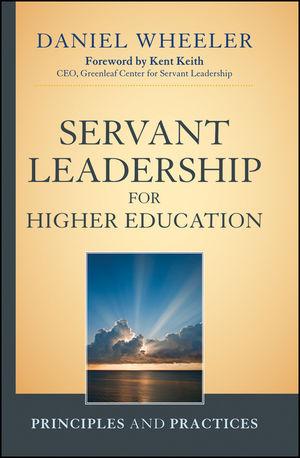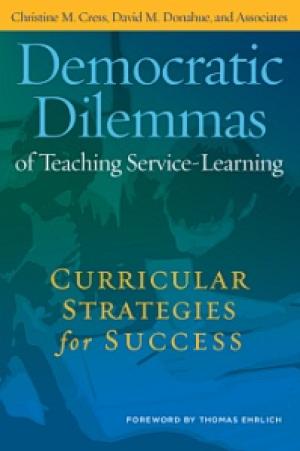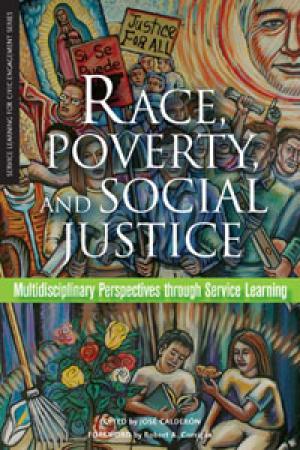Resources
One page Teaching Tactic: students work collaboratively and in role play, to understand historical agents.
One page Teaching Tactic: weekly schedule designed to encourage students to bring their questions and concerns to the subject matter.
The course “Empowering Youth for Global Citizenship” seeks to equip students to teach global citizenship by engaging them in practices of ascetic withdrawal from consumer habits and active engagement in the public sphere. These goals underlie the design of the assignments, but should have also shaped the relationship between the assignments themselves. This article addresses the issue of course design in the service of empowering students for engagement in the public sphere by reflecting upon the course assignments, with emphasis on a project that worked well, and the implications this has for its relationship to the other course assignments, including one that missed the mark. The exploration of this misalignment between the learning goals and actual outcomes of the different assignments brings to light the unique role of learning communities of accountability and acceptance in deepening the impact of assignments aimed at personal transformation, as well as the rich dynamic that can come from coordinating course assignments to bring “head, heart, and hands” together.
Undergraduate students today often enroll in introductory religious studies or theology classes because they want the time and space to reflect on their personal spiritual questions. Such a motivation can clash with the faculty’s desire to introduce students to rigorous academic study of their field. Barbara Walvoord has proposed four “voices” that students may develop that will assist both student and faculty to cross this “great divide.” This essay explores the ways in which a course based in engaged pedagogical theory and practice -- in this case, problem-based learning -- can provide an effective space for students to “find their voices,” take control of their own learning, and fulfill both their own and their professor’s expectations.
Increasing numbers of college students enrolling in religion courses in recent years are looking to develop their religious faith or spirituality, while professors of religion want students to use and appreciate scholarly tools to study religion from an academic perspective. Some scholars argue that it is not possible to satisfy both goals in the classroom, while authors in this journal have given suggestions on how to bridge the gap between faith and scholarship. I argue that such authors are correct and that, in my experience, historical-critical methods can help devout students understand the original texts in their own religion better, comprehend why changes in interpretation have occurred over time, and appreciate the values in religions other than their own. Not all devout students are comfortable with an academic study of religion, but many can attain a more mature faith by such an approach.
This article argues that there is an identifiable scholarship of teaching and learning in theology and religion that, though varied in its entry points and forms, exhibits standards of excellence recognizable in other forms of scholarship. Engaging in this scholarship enhances a professor’s possession of practice and often reveals insights into student learning and the contours of a field that can advance both educational and disciplinary projects. Through conversation with a form of the scholarship of teaching and learning that emerged most clearly in work associated with the Carnegie Foundation for the Advancement of Teaching, we describe starting points and generative assumptions that have been employed in the discourse of the scholarship of teaching and learning in theology and religion as they have emerged in submissions to Teaching Theology and Religion over the past decade and a half and point to its benefits.

If higher education is to fulfill its mission, the academy must continue to emphasize the ideals of thought, reflection, and development as well as action. This book stresses the importance of understanding that service is a pre-requisite to leadership. This practical book contains leadership principles and strategies and is based on research and best practice. The book is organized around ten principles of servant leadership and how these principles apply to common issues faced in departments and institutions of higher education. The situations addressed are representative so that it is easy to see how the principles apply to other concerns or issues. (From the Publisher)

A college student wants to lead a campaign to ban a young adult novel from his child’s elementary school as his service-learning project in a children’s literature course. Believing the book is offensive to religious sensibilities, he sees his campaign as a service to children and the community. Viewing such a ban as limiting freedom of speech and access to information, the student’s professor questions whether leading a ban qualifies as a service project. If the goal of service is to promote more vital democratic communities, what should the student do? What should the professor do? How do they untangle competing democratic values? How do they make a decision about action? This book addresses the teaching dilemmas, such as the above, that instructors and students encounter in service-learning courses. Recognizing that teaching, in general, and service-learning, in particular, are inherently political, this book faces up to the resulting predicaments that inevitably arise in the classroom. By framing them as a vital and productive part of the process of teaching and learning for political engagement, this book offers the reader new ways to think about and address seemingly intractable ideological issues. Faculty encounter many challenges when teaching service learning courses. These may arise from students’ resistance to the idea of serving; their lack of responsibility, wasting clients’ and community agencies’ time and money; the misalignment of community partner expectations with academic goals; or faculty uncertainty about when to guide students’ experiences and when direct intervention is necessary. In over twenty chapters of case studies, faculty scholars from disciplines as varied as computer science, engineering, English, history, and sociology take readers on their and their students’ intellectual journeys, sharing their messy, unpredictable and often inspiring accounts of democratic tensions and trials inherent in teaching service-learning. Using real incidents – and describing the resources and classroom activities they employ – they explore the democratic intersections of various political beliefs along with race/ethnicity, class, gender, ability, sexual orientation, and other lived differences and likenesses that students and faculty experience in their service-learning classroom and extended community. They share their struggles of how to communicate and interact across the divide of viewpoints and experiences within an egalitarian and inclusive environment all the while managing interpersonal tensions and conflicts among diverse people in complex, value-laden situations. The experienced contributors to this book offer pedagogical strategies for constructing service-learning courses, and non-prescriptive approaches to dilemmas for which there can be no definitive solutions. (From the Publisher)

This volume explores multiple examples of how to connect classrooms to communities through service learning and participatory research to teach issues of social justice. The various chapters provide examples of how collaborations between students, faculty, and community partners are creating models of democratic spaces (on campus and off campus) where the students are teachers and the teachers are students. The purpose of this volume is to provide examples of how service learning can be integrated into courses addressing social justice issues. At the same time, it is about demonstrating the power of service learning in advancing a course content that is community-based and socially engaged. To stimulate the adaptation of the approaches described in these books, each volume includes an Activity / Methodology table that summarizes key elements of each example, such as class size, pedagogy, and other disciplinary applications. Click here for the table to this title. (From the Publisher)